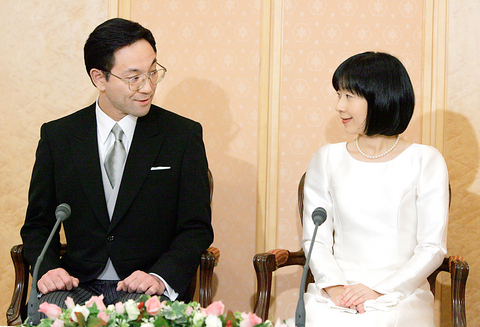Japanese Princess Sayako descended to the rank of commoner and housewife yesterday by marrying a government employee, but for many of the thousands of women watching it was still a Cinderella story.
Although Japanese women seek careers and are settling down later than ever, few families, let alone the emperor's, would talk proudly about their first-born daughter not marrying until age 36.
Perhaps that's why the well-wishers who lined the streets of Tokyo saw the wedding of the emperor's only daughter as a special happy ending.

PHOTO: AP
"I myself had so much pressure [to get married] from my family members because I'm the first daughter," said Azusa Hirai, 31, who tied the knot in April.
Hirai waited more than an hour on the roadside to witness Sayako's seven-minute parade, a modest affair for a princess who turned into a commoner under imperial tradition.
"I was really excited about her wedding," the housewife said. "I had been checking today's weather forecast for a week."
"I think she is different from Princess Masako or Princess Kiko, who married into the imperial family," she said, referring to the wives of Sayako's two elder brothers. "Sayako must have had a lot of tough time because everyone was watching her."
The crowd that gathered on the roadside from the the Imperial Palace to the Imperial Hotel, where she had the Shinto-style wedding ceremony, was not large compared with the wedding parade in June 1993 when Masako married Crown Prince Naruhito.
But about 6,000 people came out on the work day and more than 2,000 lined up to enter their names in the congratulatory books.
Sayako is the youngest child of Emperor Akihito and Empress Michiko and the last of their three children to wed. No female royal has married in her late 30s in recent history.
Sayako has married Yoshiki Kuroda, a childhood friend of her one of her brothers.

Shamans in Peru on Monday gathered for an annual New Year’s ritual where they made predictions for the year to come, including illness for US President Donald Trump and the downfall of Venezuelan President Nicolas Maduro. “The United States should prepare itself because Donald Trump will fall seriously ill,” Juan de Dios Garcia proclaimed as he gathered with other shamans on a beach in southern Lima, dressed in traditional Andean ponchos and headdresses, and sprinkling flowers on the sand. The shamans carried large posters of world leaders, over which they crossed swords and burned incense, some of which they stomped on. In this

The death of a former head of China’s one-child policy has been met not by tributes, but by castigation of the abandoned policy on social media this week. State media praised Peng Peiyun (彭珮雲), former head of China’s National Family Planning Commission from 1988 to 1998, as “an outstanding leader” in her work related to women and children. The reaction on Chinese social media to Peng’s death in Beijing on Sunday, just shy of her 96th birthday, was less positive. “Those children who were lost, naked, are waiting for you over there” in the afterlife, one person posted on China’s Sina Weibo platform. China’s

‘NO COUNTRY BUMPKIN’: The judge rejected arguments that former prime minister Najib Razak was an unwitting victim, saying Najib took steps to protect his position Imprisoned former Malaysian prime minister Najib Razak was yesterday convicted, following a corruption trial tied to multibillion-dollar looting of the 1Malaysia Development Berhad (1MDB) state investment fund. The nation’s high court found Najib, 72, guilty on four counts of abuse of power and 21 charges of money laundering related to more than US$700 million channeled into his personal bank accounts from the 1MDB fund. Najib denied any wrongdoing, and maintained the funds were a political donation from Saudi Arabia and that he had been misled by rogue financiers led by businessman Low Taek Jho. Low, thought to be the scandal’s mastermind, remains

Australian Prime Minister Anthony Albanese yesterday announced plans for a national bravery award to recognize civilians and first responders who confronted “the worst of evil” during an anti-Semitic terror attack that left 15 dead and has cast a heavy shadow over the nation’s holiday season. Albanese said he plans to establish a special honors system for those who placed themselves in harm’s way to help during the attack on a beachside Hanukkah celebration, like Ahmed al-Ahmed, a Syrian-Australian Muslim who disarmed one of the assailants before being wounded himself. Sajid Akram, who was killed by police during the Dec. 14 attack, and